Talking Point: Shocking figures reveal toll of stress on police force
Rising pressure on the police force is having a significant negative impact on the mental health of officers – and now the government has taken action. READ THE LATEST >>
Police & Courts
Don't miss out on the headlines from Police & Courts. Followed categories will be added to My News.
POLICING in Tasmania is a very different environment in 2021.
COVID-19 has and continues to affect every Tasmanian’s life, even if we are perhaps living in the safest place in Australia.
This week, the Police Association of Tasmania is holding its conference, the theme of which is ‘Safety without compromise’.
See below for the state government’s announcement at the conference of increased funding for mental wellbeing programs for frontline emergency service workers
As of the end of December 2020, our membership is facing significant and concerning wellbeing issues, including:
Of 1336.6 FTEs in the workplace:
112 WERE on open workers compensation claims (8.4 per cent of the workforce).
49 OF those are for psychological injury (more officers than are currently allocated to four of the seven, 24-hour stations in Tasmania).
37 ARE fully incapacitated, 31 for psychological injury.
NINE members in the past 19 months have had significant workers compensation payouts as they have been unable to return to work due to psychological injury.
Unfortunately, in the past four-and-a-half years, there have been:
SIX members that I am aware of who have attempted to take their own lives.
FOUR who have taken their lives.
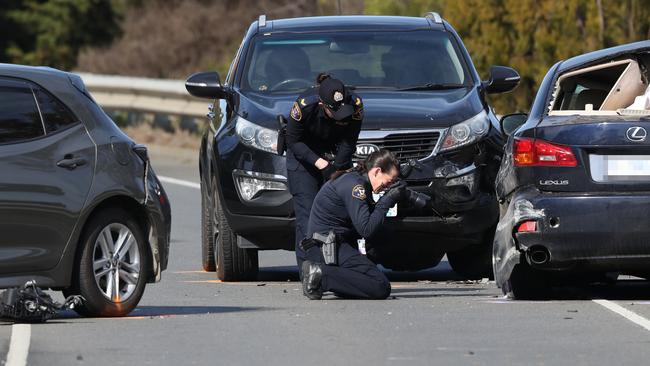
The Association wants to de-stress the policing workplace, so that our members are not strained.
We will concentrate on:
Firstly, acknowledging that policing is not an easy career.
There needs to be mandated annual psychological assessments for new members and timely treatment for those who are unfortunately showing the initial signs of injury.
Secondly, every effort made to remove unnecessary stress in the workplace.
Ensure that workloads are not unreasonably onerous.
We know members are exposed to high-stress situations as part of daily policing — traumatic scenes, violence and emotionally charged incidents.
De-stressing the workplace is about increasing police numbers and/or removing non-core tasks that members are currently doing, to free up capacity to focus on core policing.
Thirdly, when members are on workers compensation, they need to be shown genuine care in the dealings with them by the apparatus that manages workers compensation.
I also want to acknowledge several positive outcomes from the November State Budget, including:
FUNDING for a Special Operations Group of 24, with 12 officers in the North and 12 in the South, over the next three-and-a-half years.
$46 MILLION for Project Unify to remediate IT issues, following the partial implementation of a system in phase 1, with the introduction of phases 2 and 3, inclusive of online reporting.
$42 MILLION in additional police infrastructure this financial year, including the full funding of the Van Diemen vessel replacement, police houses and station upgrades.
CRUCIALLY, the government has funded a $6m voluntary wellbeing program over four years, which is both cutting edge and from feedback from members who have used it, cannot be faulted.
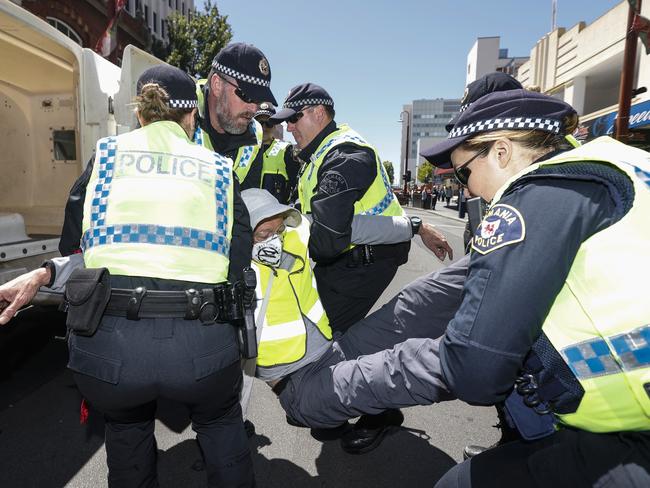
We will see the implementation of a centralised “health monitoring system” in the latter part of 2021 to enable the tracking of member’s health, including needle stick injuries, body fluid and blood exposures.
And, as committed to by the then-premier Will Hodgman, we will see a relief policy for whenever a designated country police station has a member away for any period of time.
This will reduce the strain and risk on those officers remaining in the country station cluster, with fewer officers to respond.
In 2020, statewide trials for more wellbeing friendly rostering were held, including four days on, four days off duty. This roster flexibility and support is a substantial step forward in improving a system lacking substantial change for two decades. We now await the finalisation of a fatigue management policy, an agreed objective of both Tasmania Police and the Police Association.
The extent of COVID-19 fatigue in the workplace is evident. We acknowledge that our members are best placed to provide the “safety of the community” element that underpins the government’s response to protect the community. At present, Tasmania Police supplies between 2.5 and 5 per cent of the workforce allocated to COVID-19 functions.
However, we also deliver simultaneously for a safe Tasmanian community in relation to traffic policing, criminal investigations, public order and other emergency management responses.
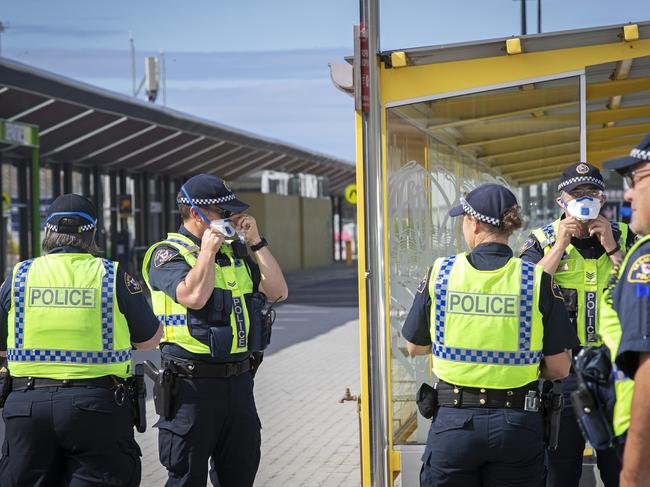
Understandably, the public expects delivery on all these other outputs, even while our members absorb additional COVID-19 tasks.
Every day, our members underpin capacity shortfalls in other government agencies, particularly outside 8am-5pm working hours. We will always do this when called upon to do so. However, other agencies shouldn’t manage that into their capability.
Finally, there are offences in the Police Offences Act dealing with assaults, abuse, and threats to members in a face-to-face context.
However, last year we had quite a few members targeted on social media with extremely baseless and offensive allegations.
A Tasmania Police officer is constrained in their responses under the police manual and cannot defend themselves.
Tasmania Police has developed a draft policy to deal with this issue.
The association’s aim is to see that the policy gets legislative “teeth”.
This too will assist with overall wellbeing for our members, preventing long-term psychological injury.
Colin Riley is president of the Police Association of Tasmania
If you need support, phone Lifeline on 131 114
Funding boost for frontline mental health
FUNDING for mental health and wellbeing programs for Tasmanian police officers and other emergency services will be doubled in an acknowledgment of how susceptible frontline workers are to psychological injury.
Premier Peter Gutwein announced at the Police Association of Tasmania conference in Hobart on Thursday morning that a further $1.5 million will be invested in the area each year — taking the total annual commitment to $3 million.
The new investment will start from April and will fund an additional clinical psychologist in the state’s North and North-West, four more wellbeing support officers statewide, an education and training officer, and an organisational psychologist.
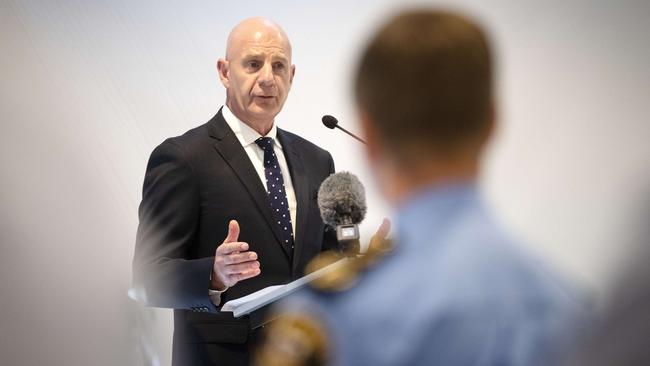
Mr Gutwein also announced that from July 1, police officers performing security duties at the Burnie courts will be replaced with security contractors.
Police Association of Tasmania president Colin Riley welcomed the news, saying it would make a significant difference.
“It puts our members back on the street where they should always be, and also increased funding for wellbeing will go to the heart of making sure our officers are safe and they go home to their families uninjured,” he said.
In opening the conference, Mr Riley outlined sobering statistics that showed the extent of the mental health problem among emergency services.
He said of the 1336 full-time equivalent staff, 112 were on open workers compensation claims, equalling 8.4 per cent of the workforce.
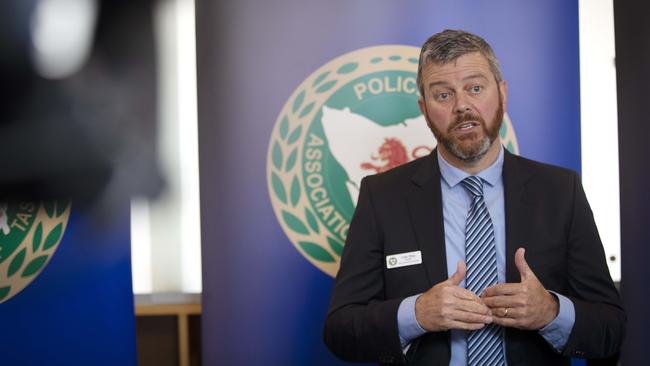
Mr Riley said 49 of those were for psychological injury, and 37 were fully incapacitated, of which 31 were for psychological injury.
He said nine members in the past 19 months have had significant workers compensation payouts while he was aware of six members who had attempted to take their own lives in the past 4½ years.
“The problem has been present in police for a long time, it’s well known through research that members suffer psychological injury,” Mr Riley said.
“I think more recently it’s become far more transparent and members are far more prepared to put their hands up ... than just let their lives unravel and leave policing a broken person.”
Mr Riley also called for mandatory psychological assessments for new members to quickly identify and address any mental health issues.
“(The funding) does what it has to do to actually continue to bale the water out of the boat, we actually need to work out how the water is getting into the boat,” he said.
Mr Gutwein said serving police saw the best and worst of the community.
“They put themselves in harm’s way, they have a very stressful role,” he said.
“We expect them to turn up at accidents, we expect them to deal with some of the most horrific sets of circumstances that any human being would need to deal with, and it’s important that we support them.”
Also attending the conference were Police Minister Mark Shelton, Opposition Leader Rebecca White, Labor’s police, fire and emergency management spokeswoman Jen Butler, and Police Commissioner Darren Hine.


